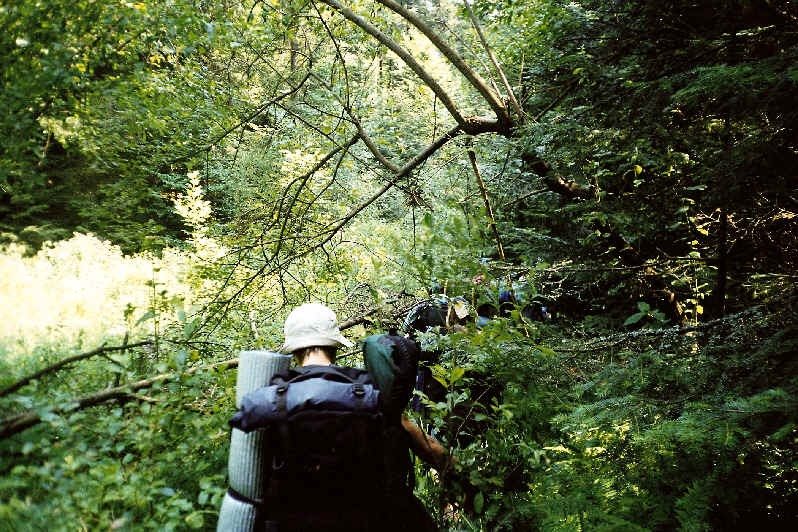
Backcountry Camping Vs. Car Camping
While car camping and backcountry camping have similar characteristics – being outside, exploring nature, having to carry a lot with you – they are most definitely not the same. It’s important to know the distinct differences between these two, otherwise you might show up either overly-prepared or not prepared enough. Know these differences, and you’ll be good to go:

The Challenges:
Backcountry camping and car camping each pose their own challenges. Challenges you can expect while car camping include finding space for supplies, pitching a tent for the first time, or starting a campfire. Car campers usually cook their own food, but public campgrounds usually help make this task easier.
The challenges of backpacking are typically more difficult. One must carry all their supplies on their back. If danger arises, you have to deal with it yourself, as you might be miles away from the closest help station. You have to set up and take down camp multiple times. Planning meals needs to be figured out long before your departure in order to have enough, while not weighing down your back. No shortcuts can be taken on first aid, and backpackers need to be prepared for the worst case scenario at all times.
The Highlights:
In car camping, the rewards are getting to spend some time in the outdoors with your closest friends and family. It’s disconnecting from things that generally prevent loved ones from spending so much time together, and instead use nature as a way to reconnect. It’s teambuilding; learning how to put together a tent or a campfire, and coming up with ways to have adventures close to your campsite.
Backcountry camping is different in this way. Backpackers might find that the rewards aren’t so obvious at first. Hiking up a large mountain or spending hours on a rugged trail might be extremely exhausting, and not necessarily someone’s idea of fun. However, whether it be reaching that waterfall, seeing wildlife in front of your eyes, or climbing to the peak of a mountain that overlooks incredible views, with patience comes pleasure. Backcountry campers get to see sides of nature that car campers don’t always get to see, but in due time.

Supplies:
S’mores might not be a priority for a person backpacking, but if you’re spending a weekend car camping, you better have a stash of marshmallows. That’s because you have the appropriate setup to do things like this. Many people nowadays even have campers and RV’s meant for the entire experience, and that certainly makes the options when car camping endless. Usually, the most important supplies consist of a tent, a sleeping bags, food, a grill, games, bikes, fishing rods, sunscreen and bug spray, lanterns, water bottles that can be easily refilled at water stations, tons of snacks, and everything else to make heading outdoors as simple and enjoyable as possible.
Someone staying in the backcountry, despite the fact they will be out for much longer, needs to bring much less. A smaller tent that can be rolled up, a small cooking mechanism, fire starters, a first aid kit, a GPS device or compass, plenty of water or a means of purifying water, good hiking boots, clothes to change into (just a few outfits), gadgets that can aid in backpacking, and a sturdy and comfortable backpack to hold it all. There’s always the issue of bringing too much or not enough. A backpacker has to be well prepared and just as good as packing a bag as he or she is at hiking.

Other Differences:
When you car camp, you might have the opportunity to shower, or at least clean off. If you don’t, it’s only a few days and you’ll get to shower properly as soon as you get home. When people backpack, they might not get to get clean for weeks on end; at least clean well. Depending on your attitude, this might make or break your desire to experience one or the other.
Car camping is easier to plan for. You can choose a campsite, figure out what’s around, and take advantage of everything there is to do within close parameters. When backpacking, there’s almost nothing you can plan for, however, you have to be prepared for anything and everything that can come your way. Blisters while camping? Not a big deal. While backpacking? This can prevent you from moving comfortably, so you must know how to tend to it. A broken bone while camping? No need to worry so much. A broken bone while out in the backcountry? You better know how to improvise a splint.
Final Thoughts:
Car camping and backpacking are both awesome experiences. However, each experience is different, and just because you’re fit for one, doesn’t mean you’d necessarily be fit for the other.
Know both what your limitations are and what you are hoping to get out of the experience, first. In the end, we recommend trying both before deciding which one is best for you!













